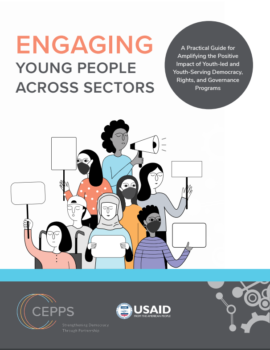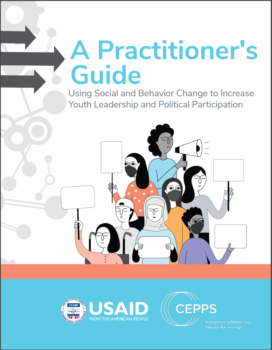Young people’s participation in public life is largely driven by specific issues or interests. This requires working across development sectors, including health, education, business, and others, to better engage young people on issues they care about, while also connecting them to spaces for decision-making and political participation. In response, in 2020, CEPPS developed the Youth Democracy, Human Rights, and Governance Cross-Sectoral Initiative (DRG CSI), a multi-phased program exploring promising practices to advance the political participation, representation, power, and leadership of young people in decision-making positions and processes. The DRG CSI has served as a virtual knowledge-sharing and creation forum dedicated to helping practitioners, donors, and young leaders across sectors explore the challenges and opportunities impacting cross-sectoral leadership and participation.

Beginning with a series of virtual monthly meetings focused on various topics across sectors, such as the Youth DRG CSI launch event, youth, peace, and security, health and humanitarian responses, and families and communities, the Youth DRG CSI sought to create a strong evidence base from which to launch its future activities. As a result of these monthly meetings, as well as additional consultations with its CSI Youth Advisory Group and other DRG practitioners, CEPPS produced several important knowledge products. These include: the Youth Barriers Analysis Tool, a diagnostic tool to identify the reasons why individual young people choose not engage in political life; Engaging Young People Across Sectors, a detailed guide on how to engage young people working in different sectors in political participation; and Social and Behavior Change to Increase Youth Leadership and Political Participation (also available in French and Spanish), which introduces readers to social behavior change (SBC) approaches in youth programming. These resources, which incorporate positive youth development (PYD) principles, serve as important guides for enhancing youth political participation and sustaining youth-led action across various sectors.

As part of the Youth DRG CSI, CEPPS developed a Barrier Analysis Toolkit (BAT), a step-by-step research guide specifically designed to identify the factors motivating young people to engage in political life or not. Understanding these motivating factors is essential for designing and implementing targeted programs that encourage greater and more meaningful political participation of young people. While the Toolkit builds upon existing barrier analysis methodologies, it has been tailored to specifically assess the political participation of young people. The BAT guides practitioners through six steps, including setting up the barrier analysis, preparing the interviews, interviewing, data entry, data analysis, and applying findings, in order to better inform program design and activity implementation. Find the full toolkit here (also available French and Spanish).
CEPPS prioritizes ways to meaningfully engage youth representing diverse and multi-sectoral backgrounds in the design and implementation of its programs targeting young people. The Youth DRG CSI has been guided by a Youth Advisory Group (YAG) since the project’s launch in 2020. Through regular consultations, YAG members representing diverse geographic, sectoral, and demographic backgrounds have collaborated with CEPPS on the development of briefs and the CSI-developed toolkits, using their experiences and perspectives as young leaders to inform these resources. Read more about the first cohort of the YAG here.

The second cohort of the Youth Advisory Group worked with CEPPS to develop user-friendly multi-lingual executive summaries of the Engaging Youth Across Sectors and Practitioners Guide, to make this tool more accessible and for a larger number of youth activists. Additionally, YAG members worked to develop the Barriers Analysis Toolkit, which supports youth-focused implementers to identify which factors, messages, and strategies will most effectively promote the sustained engagement of young leaders from across sectors in DRG programs. Additionally, through social media campaigns and awareness-raising content as well as an exchange visit to Washington, DC in June 2023, this group has worked with CEPPS to amplify the important work being done by young DRG activists globally.